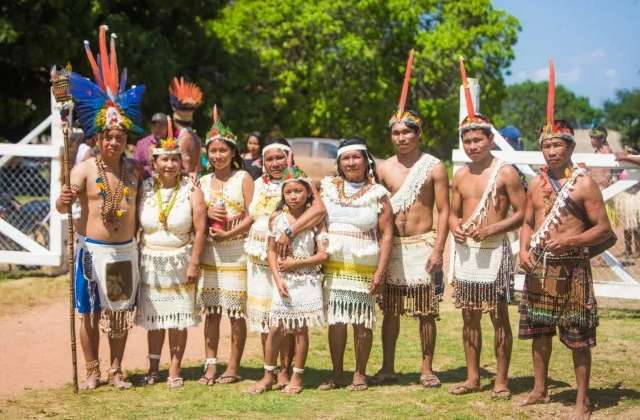Indigenous Guyanese Gaining Equitable Participation in National Resources.
Empowering Amerindian Communities: A Multi-faceted Approach to Development
The Guyanese government has embarked on a comprehensive initiative to empower its Amerindian communities, demonstrating a steadfast commitment to their social, economic, and cultural advancement. This commitment is exemplified by the substantial financial investments channeled towards various development programs, aiming to create sustainable economies, enhance livelihoods, and ensure the meaningful participation of Indigenous peoples in the nation’s progress. A cornerstone of this initiative is the recognition and celebration of Amerindian Heritage Month, with a dedicated allocation of $147 million in 2024, underscoring the government’s appreciation for the rich cultural heritage of these communities.
Central to this developmental drive is the provision of financial resources and strategic programs aimed at fostering self-sufficiency and economic growth within Amerindian villages. Over the past four years, more than 240 villages have directly benefited from government-led initiatives, witnessing a significant influx of financial support and developmental programs. The year 2024 has seen an allocation of $9 billion (approximately US$43.2 million) earmarked for further development, a sum that includes funding derived from carbon credit initiatives. This financial injection signifies a substantial commitment to improving the living standards and overall well-being of Amerindian populations. The Low Carbon Development Strategy (LCDS) 2030 plays a pivotal role in this effort, dedicating 15% of its revenue to Amerindian communities, translating to $4.7 billion disbursed in 2023 and a further $2.7 billion planned for 2024, empowering villages to pursue self-determined development pathways.
Further bolstering local economies is the expanded Presidential Grant (PG) program, which has doubled its annual allocation to small villages, now providing $1 million to each. This substantial increase enables communities to invest in critical areas such as farming, transportation, and equipment acquisition, directly contributing to improved productivity and economic stability. The 2023 allocation of $947.6 million to these projects underscores the government’s commitment to supporting grassroots development and empowering local decision-making. In addition to direct financial support, the government has prioritized capacity building and skill development within Amerindian communities. The Amerindian Development Fund (ADF) has received a significant $4.6 billion allocation, specifically targeting projects focused on women’s empowerment, food security, tourism development, and the preservation of cultural heritage. This strategic investment recognizes the importance of empowering women, ensuring food sovereignty, and promoting sustainable tourism as vital components of community development.
The government’s commitment extends beyond economic empowerment to encompass crucial areas such as land rights, education, and employment. A dedicated $800 million has been allocated for land titling, recognizing the ancestral connection of Amerindians to their land, which now constitutes 10% of Guyana’s total landmass. Further emphasizing the importance of cultural preservation and legal awareness, an additional $80 million will be invested in educational initiatives focusing on the Amerindian Act of 2006. These measures aim to strengthen land ownership rights and promote a deeper understanding of the legal framework protecting Indigenous rights.
Employment generation and skills development are central to the government’s strategy for empowering Amerindian youth. Over 50,000 jobs have been created through various employment and training programs, with 6,000 specifically designated for Amerindians. The Youth Entrepreneurship and Apprenticeship Programme (YEAP) has proven particularly successful, employing 2,700 Community Service Officers (CSOs) and injecting $1 billion into the economy annually. Moreover, a strategic partnership with Canada has secured $1.4 billion for youth empowerment initiatives, with a particular focus on supporting young women. This multi-pronged approach aims to equip young Amerindians with the skills and resources necessary to contribute meaningfully to their communities and the national economy.
Recognizing the importance of long-term sustainability, the government has implemented a $600 million initiative to support villages in developing 10-year sustainability plans. These plans prioritize environmental management and sustainable economic growth, ensuring that development initiatives are aligned with environmental protection and the preservation of natural resources. Furthermore, investments in sports development, totaling $3 million and reaching 100 villages, highlight the government’s commitment to promoting well-rounded community development. The agricultural sector has also received significant attention, with over 170 tractors and trailers distributed to villages, representing a $700 million investment aimed at enhancing agricultural productivity and food security.
The government’s commitment to improving the overall well-being of Amerindian communities extends to the provision of essential social services. Significant investments are being made in healthcare infrastructure, with four modern hospitals and 15 schools currently under construction in remote regions. The introduction of telemedicine services further expands access to healthcare, bridging the gap between remote communities and specialized medical expertise. These initiatives demonstrate a comprehensive approach to development, addressing not only economic needs but also the essential social services vital for a thriving community. The continued support for Amerindian Heritage Month, with a dedicated allocation of $147 million in 2024, underscores the government’s commitment to recognizing and celebrating the rich cultural heritage of these communities. Through these multifaceted initiatives, the government aims to foster financial stability, promote sustainable economies, and ensure that Indigenous communities play a central role in Guyana’s overall progress, reflecting a genuine commitment to inclusive and equitable development for all its citizens.
Share this content:












Post Comment